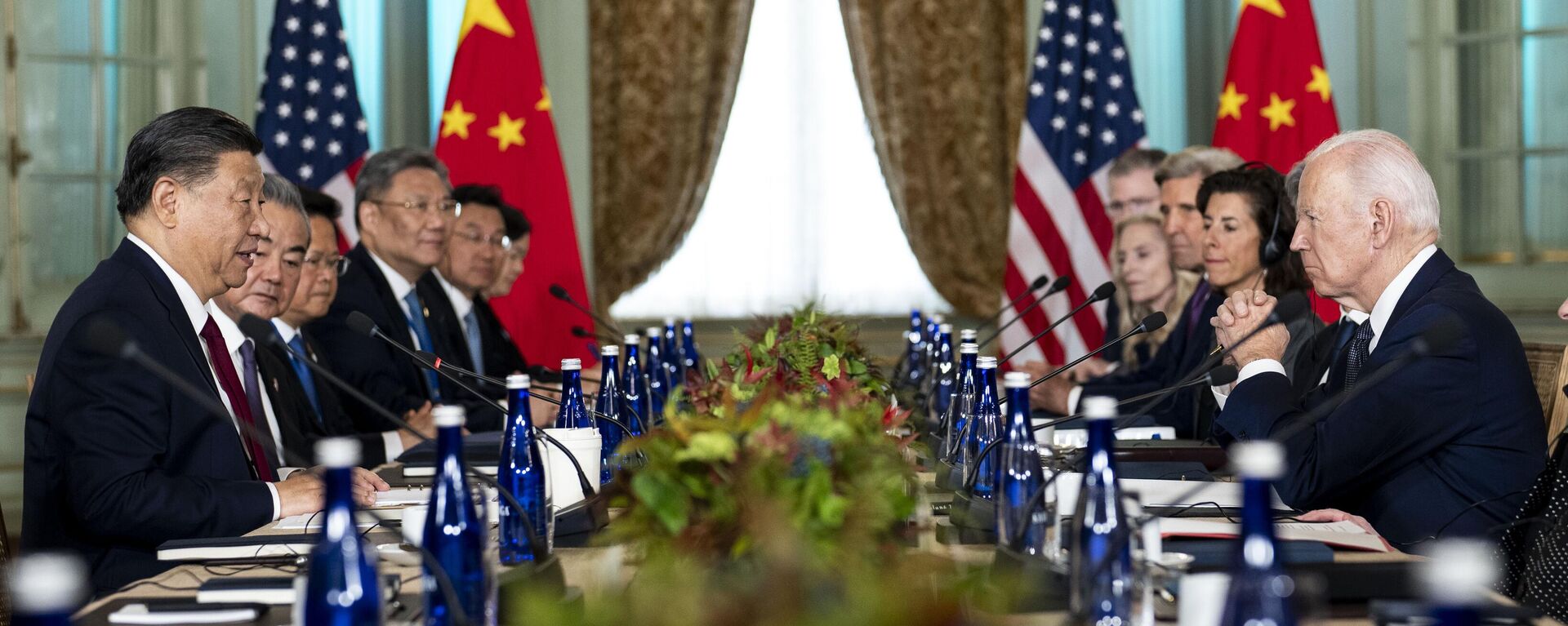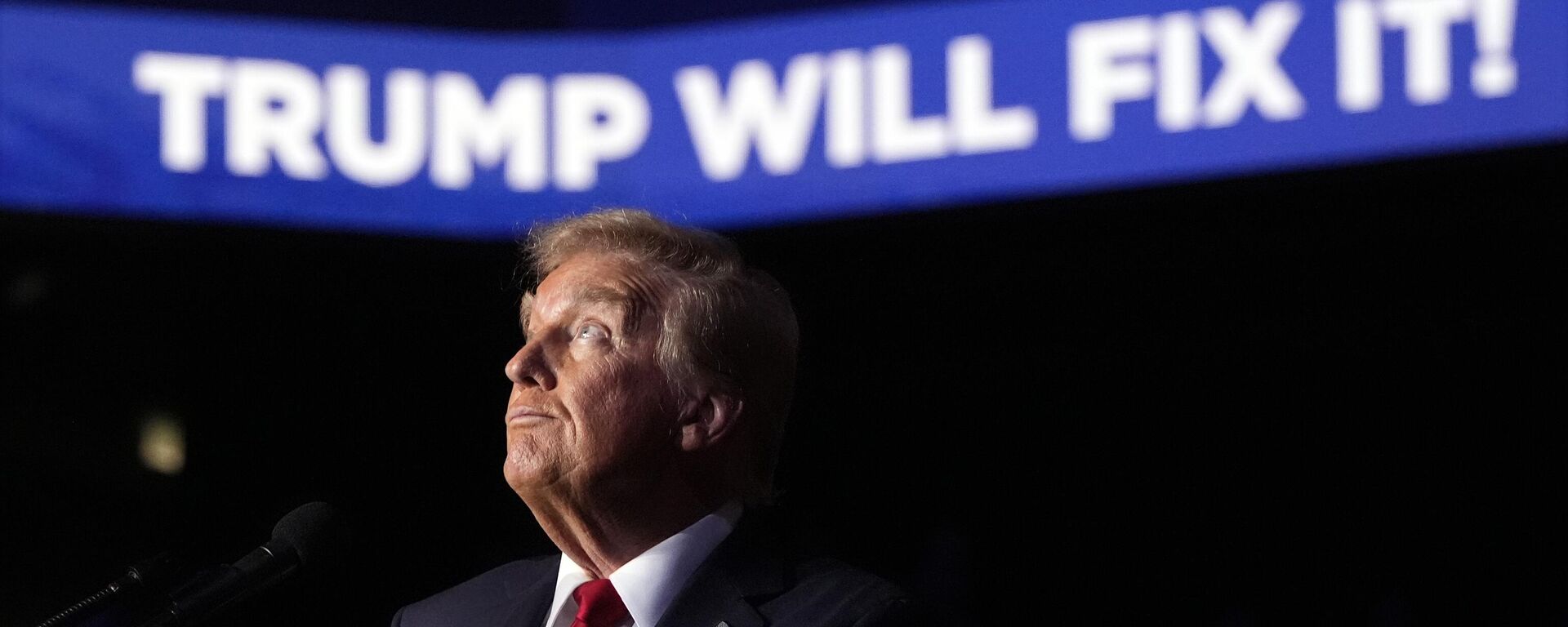https://sputnikglobe.com/20241111/former-russian-finance-minister-outlines-trumps-economic-policy-1120847368.html
Former Russian Finance Minister Outlines Trump's Economic Policy
Former Russian Finance Minister Outlines Trump's Economic Policy
Sputnik International
Donald Trump, who won the US presidential election, will cut taxes and introduce import tariffs he promised, albeit in smaller scale, while he is unlikely to impose sanctions against "de-dollarizing" countries, former Russian Finance Minister and economist Mikhail Zadornov told Sputnik.
2024-11-11T04:39+0000
2024-11-11T04:39+0000
2024-11-11T04:39+0000
world
donald trump
mikhail zadornov
russia
china
global economy
tariff war
tariffs
trump tariffs
us import tariffs
https://cdn1.img.sputnikglobe.com/img/07e8/0b/0b/1120847579_0:0:2903:1634_1920x0_80_0_0_13f09bbe8aee9cb9ea2ee5ea367a85a7.jpg
Tariff Policy"Trump's tariff policy... What will happen in reality? He will certainly raise tariffs. This will be helped by the control of both houses of Congress by the Republican Party. But this will only be done in 2026. Not in the scale [as Trump promised], I think in a much smaller scale," Zadornov said. The introduction of new tariffs will be the result of complex trade negotiations with both countries of North and Latin America, as well as with allies in Europe. This will lead to China, as before, trying to circumvent the restrictions by trading through Mexico, Vietnam and other Asian countries. However, because of this, global trade will be further fragmented, and its growth rate will certainly decrease, the economist noted. Zadornov recalled that Trump promised to introduce 20% tariffs on all imports from Europe and other countries, raise tariffs on imports from China to 60% and completely deprive China of the most favored nation status in mutual trade. In addition, during the election campaign, Trump promised to introduce measures against countries conducting de-dollarization, setting tariffs on their imports at 100%. According to Zadornov, this will be impossible to do. The fact is that it is not countries that are abandoning the dollar and switching to settlements in national currencies, but companies. State DebtAnswering about the future of the US national debt, Zadornov said that over the next 10 years the national debt, which is now approaching $36 trillion, would increase by another $7.5 trillion. In particular, Trump's tax initiatives will have an impact on this: reduced tax rates for corporations, for personal income, as well as the introduction of a tax exemption on tips. He noted that Harris's plans "cost" about half as much: under her, the national debt would also increase, but by about $3.5 trillion. At the same time, it is impossible to partially write off the US national debt, "there is no point in this, no one is going to do this," Zadornov said. "And the markets are already pricing in higher inflation, a longer period of high rates on the American market, and a slower reduction in the key rate by the Federal Reserve System. The market has already revised its initial October expectations these days," the economist concluded.
https://sputnikglobe.com/20240912/morons-running-our-country-china-policy-demonstrates-depth-of-incompetence-of-us-political-class-1120115358.html
https://sputnikglobe.com/20241106/trumps-election-win-how-will-it-change-the-world-1120758368.html
https://sputnikglobe.com/20230516/growing-debt-to-strip-us-of-status-of-worlds-top-economy-warns-investor-1110392737.html
russia
china
Sputnik International
feedback@sputniknews.com
+74956456601
MIA „Rossiya Segodnya“
2024
Sputnik International
feedback@sputniknews.com
+74956456601
MIA „Rossiya Segodnya“
News
en_EN
Sputnik International
feedback@sputniknews.com
+74956456601
MIA „Rossiya Segodnya“
Sputnik International
feedback@sputniknews.com
+74956456601
MIA „Rossiya Segodnya“
us-china trade war, us economy, us-china decoupling, us de-risking, us containment of china, trump's tariffs, trump tariffs, trump trade war, trade war, import tariff, high inflation, inflation increase, inflation hikes, growing inflation, middle class, cost of living, state debt, national debt
us-china trade war, us economy, us-china decoupling, us de-risking, us containment of china, trump's tariffs, trump tariffs, trump trade war, trade war, import tariff, high inflation, inflation increase, inflation hikes, growing inflation, middle class, cost of living, state debt, national debt
Former Russian Finance Minister Outlines Trump's Economic Policy
MOSCOW (Sputnik) - Donald Trump, who won the US presidential election, will cut taxes and introduce import tariffs he promised, albeit in smaller scale, while he is unlikely to impose sanctions against "de-dollarizing" countries, former Russian Finance Minister and economist Mikhail Zadornov told Sputnik.
"Trump's tariff policy... What will happen in reality? He will certainly raise tariffs. This will be helped by the control of both houses of Congress by the Republican Party. But this will only be done in 2026. Not in the scale [as Trump promised], I think in a much smaller scale," Zadornov said.
The introduction of new tariffs will be the result of complex trade negotiations with both countries of North and Latin America, as well as with allies in Europe. This will lead to China, as before, trying to circumvent the restrictions by trading through Mexico, Vietnam and other Asian countries.
"Chinese goods will still enter the markets of Europe and the United States," Zadornov noted.

12 September 2024, 05:24 GMT
However, because of this, global trade will be further fragmented, and its growth rate will certainly decrease, the economist noted.
"For us, this means that Russia will have to look for its trade allies in this changing global landscape," he added.
Zadornov recalled that Trump promised to introduce 20% tariffs on all imports from Europe and other countries, raise
tariffs on imports from China to 60% and completely deprive China of the most favored nation status in mutual trade.
"Let me remind you that the US trade deficit this year could be about $1 trillion. That is, for Trump, this is simply an additional source of compensation for the reduction of taxes within the United States," the former finance minister explained.

6 November 2024, 10:59 GMT
In addition, during the election campaign, Trump promised to introduce measures against countries conducting de-dollarization, setting tariffs on their imports at 100%. According to Zadornov, this will be impossible to do. The fact is that it is not countries that are abandoning the dollar and switching to settlements in national currencies, but companies.
"Often they do this precisely under the pressure of US sanctions against certain countries or corporations. And this idea is not feasible, I think it should not be seriously considered," the economist emphasized.
Answering about the future of the US national debt, Zadornov said that over the next 10 years the national debt, which is now approaching $36 trillion, would increase by another $7.5 trillion.
In particular, Trump's tax initiatives will have an impact on this: reduced tax rates for corporations, for personal income, as well as the introduction of a tax exemption on tips.
"Here are all the tax initiatives — this is approximately $4.5-$4.6 trillion over 10 years, according to the calculations of the Congressional Budget Office. With additional expenses, this is approximately $7.5 trillion increase in the national debt over the next 10 years," Zadornov explained.
He noted that Harris's plans "cost" about half as much: under her, the national debt would also increase, but by about $3.5 trillion.
At the same time, it is impossible to partially write off
the US national debt, "there is no point in this, no one is going to do this," Zadornov said.
"It is easier to inflate it, that is, in fact, for the next 5-10 years there will be higher inflation in the United States," he added.
"And the markets are already pricing in higher inflation, a longer period of high rates on the American market, and a slower reduction in the key rate by the Federal Reserve System. The market has already revised its initial October expectations these days," the economist concluded.





